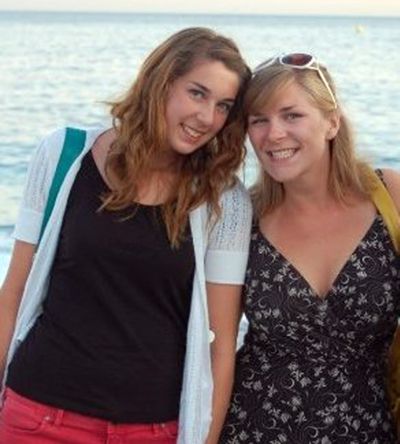Student-made shirts help Nepalese girls

It may be only October, but many high school seniors, and even juniors, are hard at work on assignments that must be completed before they don their caps and gowns.
Since 2008, Washington state graduation requirements have mandated that each senior complete a culminating project. This project must meet three distinct goals. One: Encourage students to think analytically, logically and creatively and to integrate experience and knowledge to solve problems. Two: Give students a chance to explore a topic in which they have a great interest. And three: Offer students an opportunity to apply their learning in a “real world” way.
The assignments require hours of research before they are presented to a community panel. Chris Hanson, culminating project coordinator at Shadle Park High School, has seen some interesting projects in the last two years. She’s had a student coach an elementary basketball team and another who created a Web site to market her father’s book. One student built a deck, and another did play-by-play announcing for a basketball game. But last year, Kaitlin Schilling’s culminating project astounded Hanson.
“It was unusual,” Hanson said. “I was so surprised to see a student go far beyond their immediate community. This project has global impact.”
Schilling’s project was designed to enable 11 young girls in Nepal avoid the horror of being sold to sex-traffickers by providing funds for them to stay in school.
The Shadle graduate is now a freshman at Humboldt State University in Arcata, Calif. In a phone interview, she recalled the genus of her culminating project.
“A few years ago, my older sister and I stumbled upon a human trafficking story on the Internet,” Schilling said. “We found out a lot of girls were being trafficked from Nepal to India.”
She paused as she recalled how this ugly truth affected her. “Girls as young as 11 are being sold into prostitution,” she said. It was hard for her to comprehend. “We had such happy lives. Our biggest complaint was going to school, but these girls don’t even have a chance to go to school – they are in brothels.”
Schilling wasn’t content to simply read about the problem – she wanted to be part of the solution. She decided to hold a fundraiser to help girls on the other side of the world. Schilling admitted, “I knew if I didn’t make this my culminating project – I wouldn’t follow up on the fundraiser.”
After scouring the Internet to find a worthwhile recipient, she chose the American Himalayan Foundation. Through a program called Rural Health Education Services Trust, the foundation funds the education of 6,000 girls. According to the Web site, girls who stay in school are more valued by their families and communities, and their education is a shield against traffickers. Just $100 per year is enough to keep a girl in school and save her from a horrific alternative. With the help of her sister, Krista Schilling, a senior at Eastern Washington University, Kaitlin Schilling got busy. “We designed a T-shirt,” Kaitlin Schilling said. The pale blue shirts featured the Nepalese word for “change” on the front, and the English translation on the back.
Kaitlin Schilling charged $10 for the shirts and sold them at the high school and at EWU. The eye-catching script prompted a lot of discussion and gave her a chance to educate others about human trafficking in Nepal.
“We sold 110 (shirts) and raised $1,100,” she said. Krista Schilling was glad to be involved in the project. She said, “I’d encourage kids to think bigger about what their culminating project can be.”
Hanson agreed, stressing that students’ projects can and should stretch their imagination. “This is an opportunity for students to use their critical thinking skills and showcase their talents. Every student can do something that really interests them.”
And what interests Kaitlin Schilling is helping others. She said her goal is to work in a global nonprofit organization, such as UNICEF. When she reflected on what prompted her to take on such an unusual culminating project, she found the answer quite simple. She said, “I really wanted to change those girls’ lives.”